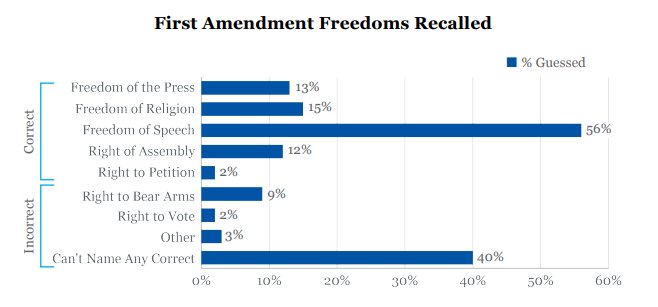Study: 40% of Americans Don't Know What 1st Amendment Guarantees
A new survey has shown that a vast number of Americans do not know which rights the Founding Fathers considered so important they were put in the First Amendment to the Constitution.
The First Amendment reads, “Congress shall make no law respecting an establishment of religion, or prohibiting the free exercise thereof; or abridging the freedom of speech, or of the press; or the right of the people peaceably to assemble, and to petition the Government for a redress of grievances.”
Although 56 percent of those surveyed recalled that the First Amendment protected freedom of speech, the numbers dropped after that, the Freedom Forum said in announcing the results.
In fact, the survey found, 40 percent of those surveyed could not name even one of the freedoms in the First Amendment.
Fifteen percent knew that freedom of religion was included in the First Amendment. Thirteen percent knew that the First Amendment included freedom of religion while 13 percent mentioned freedom of the press and 12 percent recalled that it contained the right to assembly.

The right to petition, at 2 percent, came in at the same level as those who mistakenly believed the First Amendment contained the right to vote.
The right to bear arms, which is contained in the Second Amendment, was the most common freedom mistakenly associated with the First Amendment, put there by 9 percent of those responding.
The survey said that 36 percent of those responding could recall one freedom, but only 3 percent could name four of the five freedoms.
The survey found that the more respondents knew, the less they supported First Amendment restrictions.
“Eighty-seven percent of those who were familiar with four of the five First Amendment freedoms disagreed that the government should require social media sites to monitor and remove objectionable content. This inverse relationship also held true when a variety of different demographic characteristics were held constant,” the Freedom Forum reported.
The same was true in terms of government oversight of social media platforms. Those who knew the most about the freedoms enshrined in the First Amendment were those who supported restriction the least.
In a survey of college student attitudes about the First Amendment — taken by John Villasenor and published by Brookings, 44 percent of students said “hate speech” was not protected by the First Amendment.
In fact, last year the American Civil Liberties Union said in an internal memo that some forms of free speech would not be defended by the ACLU, Independent Journalism Review reported.
In a recent op-ed published by The Hill, John Feehery, a partner at the Washington lobbying firm of EFB Advocacy and former aide to top GOP members of Congress, said that media comments claiming President Donald Trump threatens the First Amendment are off base.
“The biggest threat to the First Amendment, my dear friends, comes not from the mad tweets of an extremely unpredictable president. No, it comes from the smug left that hates it when it can’t get its way,” he wrote.
“The First Amendment, lest we forget, protects free speech, free assembly and the right to petition the government and provides that people can practice their religion freely,” he wrote. “On each point, Democrats and/or the left have sought to restrain these freedoms.”
Truth and Accuracy
We are committed to truth and accuracy in all of our journalism. Read our editorial standards.












